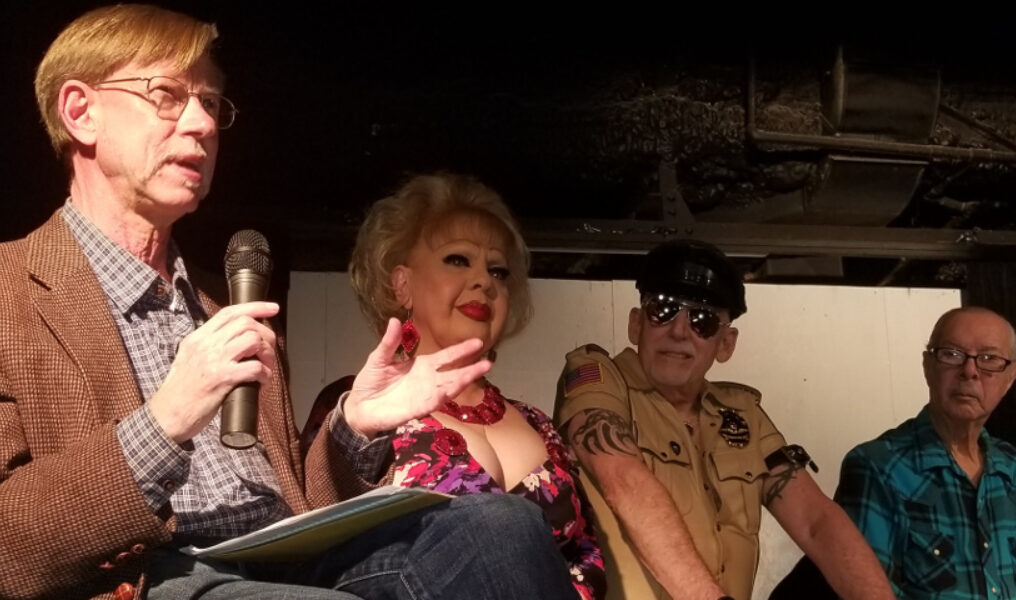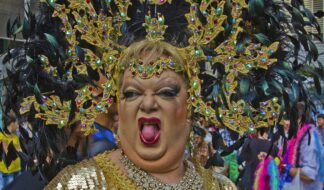Menjos Entertainment Complex General Manager Tim McKee has reason to be proud of himself. The first in a three-part series of panel discussions, this one on the history in gay bars in Detroit, drew a crowd of more than 250 people to the Olympus Theater Saturday night.
"It was amazing," McKee said. "The response was overwhelming. It was a mixture of people young and old and everything in between … races and sexes across the board. Everybody loved our mini museum. It was truly an overwhelmingly positive event."
The discussion, which was moderated by historian and Adjunct Assistant Professor of History and LGBT Studies at Michigan State University Tim Retzloff, featured a panel that included DJ Stacey "Hottwaxx" Hale, publisher of Metra magazine since 1979 Mary "Metra" Sappington, Palmer Park historian Douglas Haller, former captain of the Tribe leather group Mark Weiss and well-known drag performers Torchy and Lady "T" Tempest.
"The first gay neighborhood was downtown along Monroe Street in the city's theater district," Haller told the crowd. "Then it moved up the Woodward corridor to Wayne State, which was then called the University Cultural District. Then it moved out to Palmer Park and, eventually, Royal Oak and Ferndale."
Memories are Made of This
Drag entertainer Torchy performed as a female impersonator for the first time in 1970.
"It was a fluke," he said. "I was going with this guy and he talked me into getting into a dress and entering a contest at the Iron Hinge. I won second place. That was the first time in life I had had attention. I said, 'well I'm gonna do this again next week.' I thought I was pretty."
Torchy was an instant hit.
"They were tipping me and tipping me and I thought, 'Oh shit, I got me a profession,'" said Torchy. "Back then you didn't get paid. You worked for tips. Sometimes you'd make $5 dollars on a number sometimes $10. I made $180 dollars on one number and that was thanks to an Aretha song."
Sappington enjoyed going to gay bars long before she created her Metra magazine, which would chronicle the gay bar scene in 1979.
"I always hung out in gay bars," Sappington said. "I had a hair shop in Romeo, Michigan, and I advertised in the only gay paper that I knew of, which was Metro Gay News. So they went out of business and some friends and myself got together and decided to start Metra magazine."
Finding a printer, at first, was difficult.
"They were all too prejudiced," Sappington said. "So, we just kept going around until we found a printer. Everything is better now. If you got the money they'll print."
Sappington was also recognized for hosting the Metra picnic, which she produced for 36 years.
"It was a fun, fun, fun party," said Sappington, who alluded to the fact that the event could get a little frisky — complete with "frolicking" in the bushes. "A lot of young kids were thinking they were going to a picnic. It wasn't your grandmother's picnic.
Sappington had such a hard time finding a location for the picnic that she actually bought a park to host it in.
"Too many places gave us a hard time because we were gay," Sappington said. "We had security there but only to keep people out and keep the straight people away."
Though she discontinued the picnic several years ago, Sappington said she might just bring it back.
"I was thinking about maybe in 2019 finding a place and having a picnic," she said.
Payoffs and deadly diseases
Torchy talked to the crowd about the magnitude of the gay bar scene in Detroit in the 1970s.
"There were 45 gay bars and five steam baths," Torchy said. "It was huge in the '70s."
But, size or not, there was a cost to doing business with the gay community.
"All bars paid off back then," said Torchy. "Even if you go back far enough you'll find it was illegal to serve a known homosexual at a bar anyway."
Then, in the early '80s, the AIDS crisis hit.
"They just started dying like flies," Torchy said. "I know over 350 people alone who have died from AIDS. I have the names written down."
Weiss was affected, too.
"I personally know a number of men that have died from AIDS," he said. "I mean good friends. My husband lost his first lover to AIDS. It was frightening. AIDS was a death sentence back then."
Tempest spoke about the toll the epidemic took on her.
"When your phone rings and you're afraid to answer it because you couldn't take one more friend, family member, LGBT person dying of AIDS … it's scary. It scared the living hell out of us."
The second installment of the panel discussion series will take place Friday, June 22. The scheduled topic is the legendary queens of Detroit.











